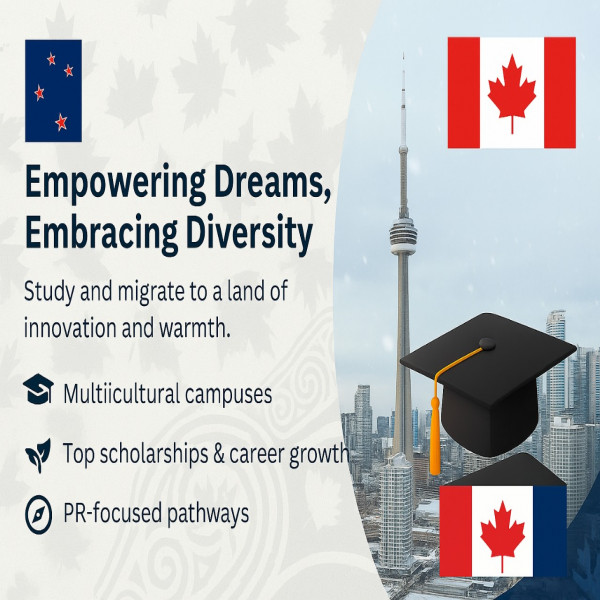New Zealand

Study in New Zealand – Overview
New Zealand is one of the most peaceful and picturesque countries in the world. Known for its world-class education system, high quality of life, and welcoming society, it has become a popular destination for international students. With strong safety measures, natural beauty, and a multicultural environment, New Zealand offers an ideal atmosphere for academic growth and personal development.
International students in New Zealand can benefit from excellent educational institutions, part-time work rights, and pathways to permanent residency. The country consistently ranks high in terms of lifestyle, education standards, and employability outcomes.
Benefits of Studying in New Zealand
- World-renowned universities and institutions
- Globally recognized qualifications
- Safe, peaceful, and multicultural society
- Work part-time during
uring studies (up to 20 hours per week)
- Affordable tuition fees and living expenses
- Pathway to post-study work visa and PR (Permanent Residency)
- English-speaking country with supportive learning environment
- Practical and industry-relevant education
- Opportunity to sponsor dependents
- Simple and transparent visa application process
Why Study in New Zealand
New Zealand offers a unique combination of excellent academic instruction and a high quality of life. It is ranked among the top countries for ease of living and student satisfaction. The education system encourages critical thinking, research, and practical application of knowledge.
Key reasons to study in New Zealand:
- Shorter and industry-aligned programs (Diplomas, Bachelors, Masters)
- Scholarships available for international students
- Safe and friendly environment
- Excellent part-time and post-study work opportunities
- Chance to settle and apply for PR after studies
Education System in New Zealand
The education system in New Zealand is well-structured, government-regulated, and offers qualifications at all levels.
1. Primary & Secondary Education
- Primary: 6–12 years old (Years 1–8)
- Secondary: 13–18 years old (Years 9–13)
2. Tertiary Education
Tertiary education includes universities, polytechnics (ITPs), and private training institutions.
3. Levels of Study (According to NZQF – New Zealand Qualifications Framework)
Level 5: Diploma (1 year)
Level 6: Advanced Diploma (1.5 – 2 years)
Level 7: Bachelor’s Degree (3 years)
Level 8: Graduate Diploma / Honours (1 year)
Level 9: Master’s Degree (1 – 2 years)
Level 10: Doctoral Degree (PhD) (3 – 4 years)
Academic Year & Intakes
- Main Intakes: February and July
- Other Intakes: May, September, November (varies by institution)
- Most institutions follow a semester-based system
Student Visa Options
- Student Visa (Fee-paying): For full-time study
- Pathway Student Visa: For students studying multiple courses over 3+ years
- Dependent Visa: Spouse and children may accompany or join you (conditions apply)
Visa Duration: Based on the length of the enrolled course.
Living Costs in New Zealand (Per Year)
Estimated annual living expenses for international students: NZD $20,000 – $25,000
Sample Breakdown:
- Accommodation: NZD $800 – $1,200/month
- Food: NZD $300 – $500/month
- Transport: NZD $100 – $200/month
- Internet & Utilities: NZD $100/month
- Personal Expenses: NZD $100 – $300/month
Application Procedure
Documents Required:
- Passport
- Academic Certificates & Transcripts
- IELTS/TOEFL/PTE Scorecard
- Statement of Purpose (SOP)
- CV/Resume
- Letter of Recommendation (2)
- Offer of Place from New Zealand institution
- Evidence of Funds (Tuition + Living)
- Medical and Police Certificates
- Proof of accommodation (if required)
Entry Requirements
Undergraduate (Bachelor’s Degree)
- High School Certificate (12 years of education)
- IELTS 6.0 overall (with no band less than 5.5)
Postgraduate (Master’s Degree)
- Recognized Bachelor's Degree
- Work experience (preferred for MBA and professional programs)
- IELTS 6.5 overall (with no band less than 6.0)
Visa Process (Step-by-Step)
1. Choose your course and institution
2. Apply and receive Offer of Place
3. Provide evidence of funds
4. Complete medical and police checks
5. Pay tuition fees
6. Receive the Fee Receipt and Final Offer Letter
7. Apply for Student Visa online (INZ website)
8. Wait for visa outcome
9. Book your flight and arrange accommodation
Financial Requirements
You must show proof of:
- Tuition fee for 1st year (paid or ready to pay)
- NZD $20,000 for 1 year of living expenses
- Return airfare or funds to purchase ticket
- Sponsor’s affidavit and proof of income (if applicable)
Post-Study Work Rights
After completing a Level 7 or above qualification (Bachelor’s, Graduate Diploma, Master’s):
- Work Visa Duration: 1 to 3 years depending on level and location of study
- Allows full-time work
- Can apply for PR through Skilled Migrant Category (SMC) if eligible
Job Opportunities
Part-Time Work (During Study)
- 20 hours/week during academic sessions
- Full-time during scheduled holidays
- Minimum wage: NZD $23.15/hour (as of 2025)
Post-Study Full-Time Work
- Gain skilled experience to apply for PR
- Demand in sectors like: IT, Accounting, Agriculture, Engineering, Health, Hospitality
Notes for Students
- Must maintain attendance and progress in studies
- Must hold valid health insurance during stay (NZ Student Medical Insurance)
- Visa conditions must be followed strictly
- Dependents (spouse/children) may work/study based on visa type
